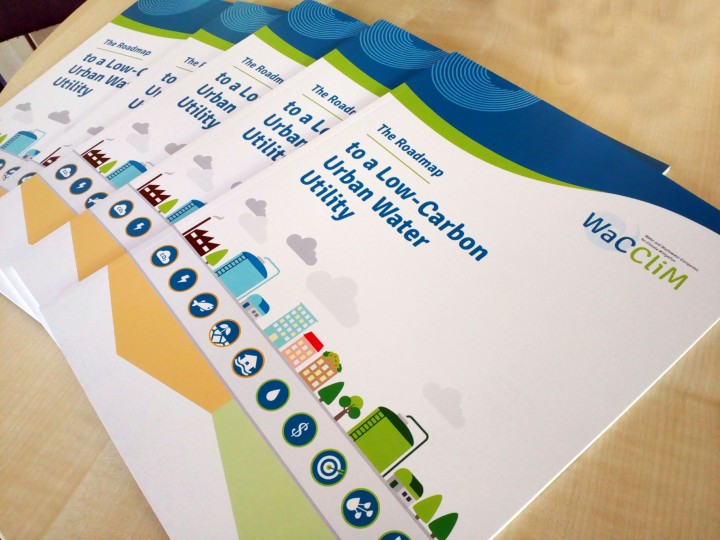Water and Wastewater Companies for Climate Mitigation (WaCCliM)
2013 - 2022 • Deutsche Gesellschaft für Internationale Zusammenarbeit (GIZ) GmbH
Purpose
Support a low-carbon, climate resilient urban water sector by introducing greenhouse gas-reducing solutions to improve the CO2 balance of water and wastewater utilities.
Activities
Climate change intensifies the challenges faced by the water sector. Besides the services provided by water and wastewater utilities, the technologies employed by water supply and wastewater systems lead to substantial emission of greenhouse gases (GHG), which are partly attributed to water and energy losses.
The Water and Wastewater Companies for Climate Mitigation (WaCCliM) project supports water and wastewater utilities in its partner countries in identifying processes and technologies to reduce their energy and carbon footprint. In addition, the project supports the raise of awareness, capacity building and technical strengthening of key actors within the water sector, encouraging utilities to reduce their GHG emissions while adapting to climate change, thus reducing their vulnerabilities. In this regard, WaCCliM supports the utilities on the path of becoming climate friendly, while engaging with national governments and the international water and climate community.
The project developed a roadmap with systematic steps and concrete measures towards low-carbon water utilities. In this context, WaCCliM promotes the use of digital solutions such as ECAM (Energy Performance and Carbon Emissions Assessment and Monitoring Tool), a tool developed by the project and used to assess the carbon emissions, identify energy saving opportunities and monitor the GHG and energy reduction impacts of the implemented measures. ECAM provides areas for reducing emissions by considering all components of the urban water cycle, from the water supply, wastewater treatment or water reuse to faecal sludge containment, treatment and disposal. Another contribution is the development and management of a knowledge platform ‘Climate Smart Water’ that publishes and provides access to the information of the project.
Images

Image: WaCCliM Roadmap © Elaine Cheung - GIZ
Countries of activity
Location of main activity
Objectives
Through the technical assistance to the pilot projects in Mexico, Peru, Jordan and Thailand, around 8,800 tons of CO2 equivalent per year have been avoided, in addition to reducing the energy consumption and operational costs.
The city of Madaba, Jordan identified potentials for GHG reduction in the areas of biogas utilisation, pump efficiency, renewable energies and water loss reduction. By installing variable frequency drives and energy-efficient pumps, the water utility saves around 1,000 tons of CO2 equivalent per year.
Process optimisation measures at one municipal wastewater treatment plant in San Francisco del Rincón, Mexico lead to a 50 per cent reduction in its carbon footprint (circa 2,500 tons of CO2 equivalent per year).
In the city of Cusco in Peru, approximately 5,300 tons of CO2 equivalent are avoided each year through optimised sewage sludge treatment. In addition, there is an initiative for electricity generation of biogas by a cogeneration system through which more than 550 tons of CO2 equivalent could be avoided annually.
Additionally, more than 300 water professionals of the partner countries have participated in trainings on climate mitigation in the urban water sector and the ECAM tool.
Further information
WaCCliM is an initiative of the Deutsche Gesellschaft für Internationale Zusammenarbeit (GIZ) and the International Water Association (IWA) and is funded by the German Federal Ministry for the Environment, Nature Conservation and Nuclear Safety (BMU) as part of the International Climate Protection Initiative (IKI).
Organisations involved:
Deutsche Gesellschaft für Internationale Zusammenarbeit (GIZ), International Water Association (IWA), Water Authority of Jordan (WAJ), Comisión Nacional del Agua (CONAGUA) [National Water Commission (CONAGUA)], Ministerio de Vivienda, Construcción y Saneamiento (MVCS) [Ministry of Housing, Construction and Sanitation (MVCS)]
Videos
WaCCliM in Jordan
Contact information
WaCCliM
Login to see the e-mail-adress of the contact person.
Sören Rüd
Login to see the e-mail-adress of the contact person.
Filter tags
Biogas systems Constructed wetlands Decentralised wastewater treatment (e.g. DEWATS) East Asia & Pacific Educators Enabling environment and institutional strengthening Europe & Central Asia Faecal sludge treatment processes German government Government-owned entity (not university or research) Greywater or wastewater Latin America & Caribbean Middle East & North Africa Operation, maintenance and sustainable services Politicians and local decision makers Practitioners Renewable energies and climate change Technology comparisons Treatment of wastewater or greywater Urban (entire city)
Attached files
Links
Deutsche Gesellschaft für Internationale Zusammenarbeit (GIZ) GmbH
Eschborn
Germany
Uploaded by:
Elisa Rose (ElisaRose)















